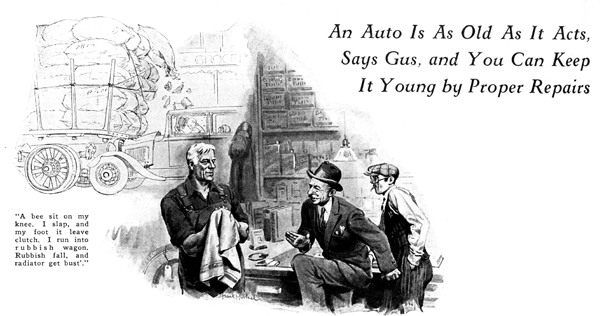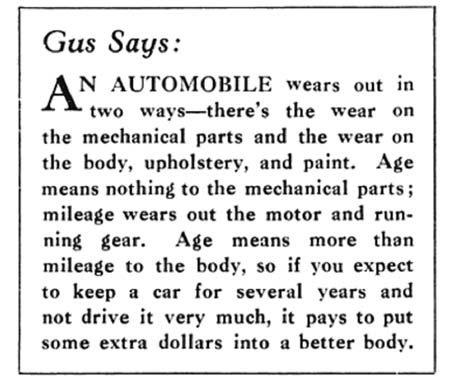May 1931
SHOULD LAW SCRAP OLD CARS?
by Martin Bunn

Gus Wilson, half owner of the Model Garage, had about decided to call it a day when his partner Joe Clark called him to the window.
"What's the idea of the fancy decorations?" Joe asked, pointing to a small sedan that was coming slowly down the road. The car certainly looked queer. Scraps of paper and strings of various colors fluttered in the breeze. A short piece of brown paper was wrapped around the front axle and the remains of a burlap bag dragged from the rear bumper.
Gus gazed at it wonderingly, but before he had time to make a reply the car swung in and came in a bucking halt in front of the garage. Immediately there came a loud hissing sound, clouds of steam poured out of the openings in the hood, and a torrent of steaming water rained down and formed a pool under the motor.
The two garage men came out in time to see the owner pop out of the car and shake his fist at the offending radiator.
"Sacre!" he yelled. "After all these mile' I have driven you little pig, you try to push the van full of the rubbish from the road -- and see what happen? Jules Marceau, he punish you!" And he backed up his threat with a vigorous kick administered to the unoffending front tire.
Gus calmed the excited little man and led him into the office. "Tell us what happened, Mr. Marceau," he suggested. "Perhaps it is a little bit my fault," Marceau began, his wrath rapidly evaporating. "I take Marie to the shops this afternoon and I wait for the traffic light behind a grand big track filled with bags of the rubbish. A bee jump through the window and he sit on my knee. I slap, and my foot it leave -- how you call, the clutch -- and my car it jump right into the rubbish wagon. The rubbish it come down all over me and the radiator get bust. Is it not what you call bad luck?"
Gus grinned. "Bad luck and poor management," he observed. "If you hadn't had the car in gear, you could have taken a poke at the bee without having your car jump ahead.
"Of course, lots of drivers put the gears in first speed when they stop in traffic and keep their feet on the clutch pedals waiting for the signal to go ahead. But you shouldn't do that. Anything that happens to make you move suddenly -- like the bee that landed on your knee or maybe a hot cigar ash falling on your hand or even a little cramp in your leg muscle -- is going to make you take your foot off the clutch pedal and slam into whatever is ahead of you. You're lucky you weren't at the head of the line with a lot of people walking across the street a foot or two from your bumper. You might have killed somebody.
"Besides," he continued, "you're putting a lot of extra work on the clutch throwout bearing when you stand in first gear with the clutch pedal down."
"But I do not stand in the first gear," Marceau protested. "I am such a good driver I do not need the first speed. Me, always I start in the middle speed."
"Humph!" the veteran auto mechanic grunted. "If you start in second all the time, I'll bet your clutch lining is pretty near worn out already. Starting in second is bum dope unless you have a four-speed transmission with first geared so low that it isn't any use. Let's take a look at that car."
They pushed it inside and Gus investigated the extent of the damage.
"Not so bad," he said. I'll fix the supports and put on a new hose connection and it'll be all right except for that dent in the hood. I'll roll that out, too, if you'll bring it in tomorrow."
As with every car that came into the place, Gus inspected it to see if any vital part was out of order. He poked at the brake pedal, thumbed the horn button, fingered a broken spot in the windshield wiper hose, and squinted at the wheel alignment.
"Looks to me like you had a few other little jobs here, Mr. Marceau," he said. "The brakes need taking up, the horn doesn't work and the windshield wiper is out of commission."
"Poof!" exclaimed Marceau waving his fingers expressively. "The brakes you should fix, yes, but these other little things are as nothing. I do not like the sound of the horn and never do I drive in the rain."
"Maybe so," Gus growled. "But if you ever meet an inspector he'll think different. Blowing a horn all the time is silly business, but there's times when the horn may save some child's life or your own. As for the windshield wiper, you must be some weather prophet if you can be sure you're never going to be caught in a driving rainstorm at night!"
"I have not think of it so," said Marceau, "It is the one time in the thousand that the noise maker is necessary. That is true! Fix it at once! Never will I take the chance again. And the scrubber of the windshield also."
"That's the way to talk, said Gus with a smile. "With all the cars that are around today, everybody's got to keep his machine right or pretty soon there'll be a lot of new inspectors on the road just looking for defects like that. A little while ago they stopped a lot of cars in another state and nearly a quarter of 'em had bum lights that couldn't pass inspection."
"Inspect mine please," Marceau suggested and grinned with pleasure when Gus found them in good shape.
"You see it's this way, Mr. Marceau," Gus went on as he set about adjusting the car. "Today the roads are jammed with cars. You'll meet hundreds on a trip for every ten you met a few years ago. And everywhere the speed laws have been made more reasonable so all cars travel lots faster now than they used to. I can remember only a few years back when you got pinched on our boulevard if you went over twenty miles an hour. Now if you don't move along at thirty when traffic is heavy you're likely to get a ticket for obstructing the road!
Cars are getting more powerful. Weights are not going down. To balance that we've got four-wheel brakes and big tires that get a good grip on the road. The higher speeds of today really are safer than the slower speeds of yesterday, if -- and that's a great big if -- everything about the car is working as it should.
"There's a bit of talk right now about condemning all cars over a certain age and putting them off the road. We may come to that in the end, but it always seemed to me like a kind of silly way to look at it. Maybe the people who keep preparing it will get the straight of it after a while. It isn't the age of a car that makes it safe or not. What counts is its conditions. A five-year-old car in perfect shape is a lot safer bet than one two months old with the brakes out of whack and a lot of other things the matter with it," Gus continued as he finished the brakes and started on the next job.
"Aha, my little cabbage!" whispered Marceau, petting the crumpled mudguard of his car affectionately. "Me, I will make very sure they do not condemn you, little one. Beginning with the now we will have your ills fixed at once, or before that, even!"
END
L. Osbone 2019
